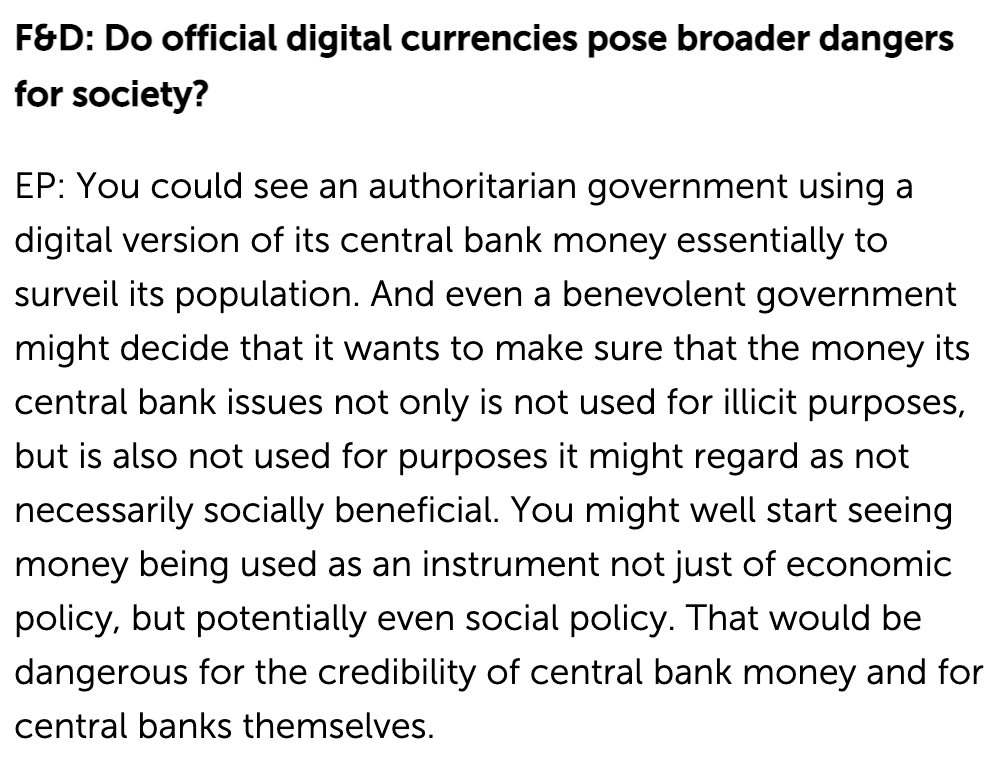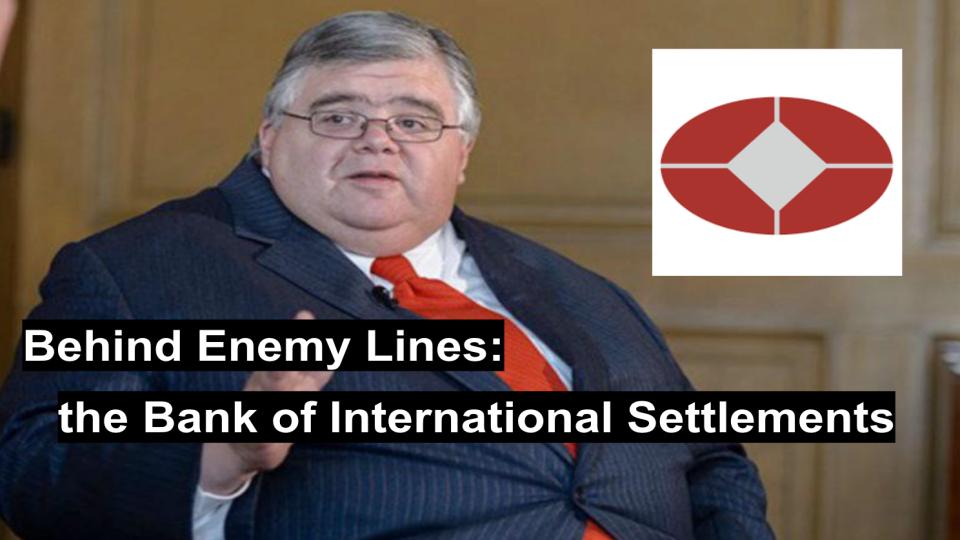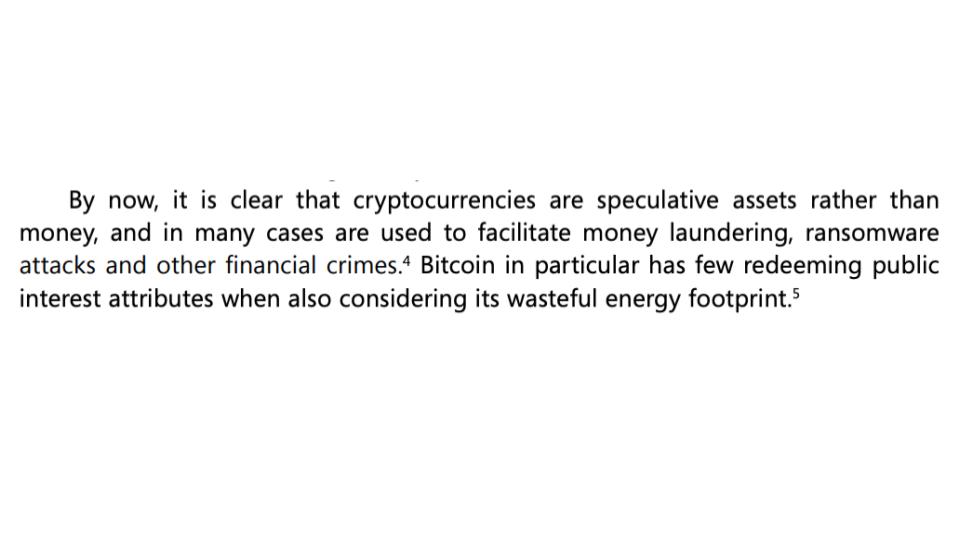
I’ve been behind enemy lines reading everything the IMF has put out in the last 2 years.
Here are 10 pieces I found most relevant to Bitcoin.
“When you are thoroughly conversant with strategy, you will recognize the enemy’s intentions and thus have many opportunities to win."👇
Here are 10 pieces I found most relevant to Bitcoin.
“When you are thoroughly conversant with strategy, you will recognize the enemy’s intentions and thus have many opportunities to win."👇

1)imf.org/en/Publication…
Let’s start with the IMF's note titled “Blockchain Consensus Mechanisms: A Primer for Supervisors”
It might as well have been titled “Slander Proof of Work and Promote Proof of Stake”.
Here is an excerpt that sums it up in a nutshell👇
Let’s start with the IMF's note titled “Blockchain Consensus Mechanisms: A Primer for Supervisors”
It might as well have been titled “Slander Proof of Work and Promote Proof of Stake”.
Here is an excerpt that sums it up in a nutshell👇

With PoW, the IMF admits it's the most decentralized, secure, and resilient.
They also say:
- It's prone to centralization cuz of mining pools. (false)
- Forks make achieving settlement finality hard. (false)
- PoW’s decentralization makes it more difficult to regulate. (true)
They also say:
- It's prone to centralization cuz of mining pools. (false)
- Forks make achieving settlement finality hard. (false)
- PoW’s decentralization makes it more difficult to regulate. (true)
It frequently cites Alex de Vries, a dishonest Dutch central banker who uses flawed methodologies to estimate Bitcoin’s environmental footprint.
Read why here: bitcoinmagazine.com/business/not-s…
The IMF predicts regulators will find PoW’s “damaging impacts to the environment unacceptable”
Read why here: bitcoinmagazine.com/business/not-s…
The IMF predicts regulators will find PoW’s “damaging impacts to the environment unacceptable”
They are more fond of PoS.
They like the tx speeds and incorrectly note that it’s more difficult and expensive to perform a 51% attack on PoS compared to PoW.
They correctly note that PoS can “fuel an environment where the rich get richer” and “flaws can lead to centralization”
They like the tx speeds and incorrectly note that it’s more difficult and expensive to perform a 51% attack on PoS compared to PoW.
They correctly note that PoS can “fuel an environment where the rich get richer” and “flaws can lead to centralization”
They seem to like DPoS even more.
They argue its benefits are “energy savings, greater decentralization, and positive participant behaviors”.
They touch on the risk of centralization but still speak highly of it.
Side Note: they cite serial scammer Dan Larimer in this paper 😂
They argue its benefits are “energy savings, greater decentralization, and positive participant behaviors”.
They touch on the risk of centralization but still speak highly of it.
Side Note: they cite serial scammer Dan Larimer in this paper 😂

2.)imf.org/en/Publication…
This piece is titled “Cleaning Up Crypto”. Another attack on PoW.
Once again they cite de Vries’s debunked studies on Bitcoin and compare a single Bitcoin tx's carbon emissions to 1.8 million Visa purchases.
They push PoS as a solution to Bitcoin.
This piece is titled “Cleaning Up Crypto”. Another attack on PoW.
Once again they cite de Vries’s debunked studies on Bitcoin and compare a single Bitcoin tx's carbon emissions to 1.8 million Visa purchases.
They push PoS as a solution to Bitcoin.
This chart crime is in the article.
It's titled "Energy Guzzler" -- such scary language.
It incorrectly calculates BTC’s carbon footprint per transaction and states that BTC adds to the demand for coal-fired power.
The IMF exaggerates and catastrophizes Bitcoin's energy usage.
It's titled "Energy Guzzler" -- such scary language.
It incorrectly calculates BTC’s carbon footprint per transaction and states that BTC adds to the demand for coal-fired power.
The IMF exaggerates and catastrophizes Bitcoin's energy usage.

3.)imf.org/en/Publication…
Here, the IMF explores how to regulate virtual assets (VAs).
“VAs pose a significant threat to the integrity of the global financial system, money laundering, terrorist financing, and the financing of the proliferation of weapons of mass destruction”
Here, the IMF explores how to regulate virtual assets (VAs).
“VAs pose a significant threat to the integrity of the global financial system, money laundering, terrorist financing, and the financing of the proliferation of weapons of mass destruction”
You read that right...the IMF hints that virtual assets are being used to finance the proliferation of nuclear weapons.
Is there any evidence of the direct connection between VAs and weapons of mass destruction? 😂
I didn’t find any, but it sure does sound scary!
Is there any evidence of the direct connection between VAs and weapons of mass destruction? 😂
I didn’t find any, but it sure does sound scary!
Some takeaways:
- The IMF is most concerned about stablecoins.
- Recommend obtaining info about transactions like IP addresses, wallet info, and info of tx recipient and originator.
- Want to bypass the courts with asset freezing/seizure to allow faster regulator response times.
- The IMF is most concerned about stablecoins.
- Recommend obtaining info about transactions like IP addresses, wallet info, and info of tx recipient and originator.
- Want to bypass the courts with asset freezing/seizure to allow faster regulator response times.
One thing is clear…the IMF hates decentralized cryptocurrencies (Bitcoin) that make it more difficult for them to regulate, and any "anonymity enhancing features" like mixers, ring signatures, and VPNs that obfuscate identifying information.
The IMF doesn't like privacy.
The IMF doesn't like privacy.

4.)imf.org/en/Publication…
This is part 2 of their plans to regulate VAs. In the introduction, weapons of mass destruction are mentioned again.
They advise virtual asset service providers (VASPs) to use digital IDs & acquire biometric data of their customers to prevent crimes.
This is part 2 of their plans to regulate VAs. In the introduction, weapons of mass destruction are mentioned again.
They advise virtual asset service providers (VASPs) to use digital IDs & acquire biometric data of their customers to prevent crimes.
They support FATF guidelines that VASPs do due diligence on customers & non-customers for transactions that are >$1,000.
They acknowledge the threshold is lower than traditional standards, but they argue that given the “particular risks of VAs”, stricter standards are justified.
They acknowledge the threshold is lower than traditional standards, but they argue that given the “particular risks of VAs”, stricter standards are justified.
They recommend VASPs adhere to the “travel rule” -- to know the originator and beneficiary info of all txs.
They admit, “there are not sufficient tech solutions that enable VASPs to comply with all aspects of the travel rule."
The IMF advises policymakers to demand this anyway.
They admit, “there are not sufficient tech solutions that enable VASPs to comply with all aspects of the travel rule."
The IMF advises policymakers to demand this anyway.
The IMF justifies stricter standards despite a recent report that found illicit activity consisted of 0.15% of crypto volume.
Also, don't forget that AML policies have impacted only 0.05% of criminal finances.
This appears to be more about control rather than stopping crime.

Also, don't forget that AML policies have impacted only 0.05% of criminal finances.
This appears to be more about control rather than stopping crime.


5.)imf.org/en/Publication…
This study uses data from a 2020 survey.
Not surprisingly, their model concludes, “crypto-asset usage is significantly and positively associated with corruption”
This will no doubt be used to justify increased regulation despite its tiny sample size.
This study uses data from a 2020 survey.
Not surprisingly, their model concludes, “crypto-asset usage is significantly and positively associated with corruption”
This will no doubt be used to justify increased regulation despite its tiny sample size.
6.)imf.org/en/Publication…
In this IMF report, I came across a new term, “cryptoization”, which refers to the risk of currency substitution occurring in emerging markets.
The IMF now has a term for when citizens opt out of their failing local currencies into digital assets...
In this IMF report, I came across a new term, “cryptoization”, which refers to the risk of currency substitution occurring in emerging markets.
The IMF now has a term for when citizens opt out of their failing local currencies into digital assets...
The IMF doesn’t like cryptoization because it “weakens central bank credibility”, highlights unsound central bank policy, and makes it harder to implement that policy.
As citizens of developing countries seek safer stores of value to flee their currencies, the IMF is like...
As citizens of developing countries seek safer stores of value to flee their currencies, the IMF is like...
7.)imf.org/en/Publication…
The IMF would prefer people not to have an exit at all, which is why they're so excited about CBDCs.
This paper is an overview of 6 of the most advanced CBDC projects: China, Bahamas, Sweden, Canada, Uruguay, and the Eastern Caribbean Currency Union.
The IMF would prefer people not to have an exit at all, which is why they're so excited about CBDCs.
This paper is an overview of 6 of the most advanced CBDC projects: China, Bahamas, Sweden, Canada, Uruguay, and the Eastern Caribbean Currency Union.
One of the most eyebrow-raising parts of the paper is when the IMF explores how CBDC could be used to remove the “problem” of anonymity in cash.
“Some features of cash, including anonymity, make it attractive for illicit transactions. CBDC could potentially reduce this problem.”
“Some features of cash, including anonymity, make it attractive for illicit transactions. CBDC could potentially reduce this problem.”
None of the CBDC projects covered fully protect user privacy.
Some of them offer “quantitative restrictions” in that they offer anonymity for “lower tier” people to help them onboard if they don’t have IDs.
Central banks make the rules that determine who gets privacy and why.
Some of them offer “quantitative restrictions” in that they offer anonymity for “lower tier” people to help them onboard if they don’t have IDs.
Central banks make the rules that determine who gets privacy and why.

8.)imf.org/en/News/Articl…
This contains remarks from an IMF employee on how CBDC design choices can overcome the risks.
It displays the coercive nature of CBDCs and the power it would grant central banks. Notice the choice of words: “limit”, “restrain”, “impose”, and “capped”.
This contains remarks from an IMF employee on how CBDC design choices can overcome the risks.
It displays the coercive nature of CBDCs and the power it would grant central banks. Notice the choice of words: “limit”, “restrain”, “impose”, and “capped”.

On CBDC development, they write, “The IMF is collaborating with the BIS, the CPMI, and the FSB to establish relevant guidelines.”
That’s multiple non-governmental organizations designing the future global financial system with zero oversight.
Who voted for any of these people?
That’s multiple non-governmental organizations designing the future global financial system with zero oversight.
Who voted for any of these people?
9.)imf.org/en/Publication…
This one argues for a transition to electronic money to enforce negative interest rates.
They stress that a design requirement of CBDCs is they must be interest-bearing to allow for the implementation of negative interest rates.
How about...no.🖕
This one argues for a transition to electronic money to enforce negative interest rates.
They stress that a design requirement of CBDCs is they must be interest-bearing to allow for the implementation of negative interest rates.
How about...no.🖕
10.)imf.org/en/Publication…
Lastly, this interview in the IMF’s flagship magazine, proves the IMF is well aware of the real risks posed by CBDCs but is continuing with its plans anyway.
Author Eswar Prasad candidly explained to an IMF employee the danger that exists with CBDCs👇
Lastly, this interview in the IMF’s flagship magazine, proves the IMF is well aware of the real risks posed by CBDCs but is continuing with its plans anyway.
Author Eswar Prasad candidly explained to an IMF employee the danger that exists with CBDCs👇

From their own publications, one can see how the IMF attacks Bitcoin.
They scold PoW's energy and criticize Bitcoin for facilitating illicit activity to justify regulatory overreach.
They push CBDCs and centralized PoS coins as viable alternatives cuz they’re easier to control.
They scold PoW's energy and criticize Bitcoin for facilitating illicit activity to justify regulatory overreach.
They push CBDCs and centralized PoS coins as viable alternatives cuz they’re easier to control.
PoW vs PoS/CBDCs and BTC vs ESG
These are the battlegrounds.
The IMF wants to push PoW alternatives because they allow them to enforce their unsound policies with impunity. Negative interest rates, surveillance, inflation, etc.
The IMF can't exert its power & control with PoW.
These are the battlegrounds.
The IMF wants to push PoW alternatives because they allow them to enforce their unsound policies with impunity. Negative interest rates, surveillance, inflation, etc.
The IMF can't exert its power & control with PoW.
Only Bitcoin is decentralized & censorship-resistant. Its energy use enables it to function as sound, incorruptible money.
Bitcoin consumes ~0.05% of global energy consumption.
So why all the fuss about Bitcoin?
It’s because Bitcoin can’t be controlled..and the IMF hates that.
Bitcoin consumes ~0.05% of global energy consumption.
So why all the fuss about Bitcoin?
It’s because Bitcoin can’t be controlled..and the IMF hates that.

Thanks for reading.🙏
If you found this valuable, give me a follow for more threads like this.
To end with…here’s a clip of IMF Managing Director Kristalina Georgieva sticking to the IMF’s playbook of discrediting Bitcoin while promoting other alternatives.
If you found this valuable, give me a follow for more threads like this.
To end with…here’s a clip of IMF Managing Director Kristalina Georgieva sticking to the IMF’s playbook of discrediting Bitcoin while promoting other alternatives.
• • •
Missing some Tweet in this thread? You can try to
force a refresh











